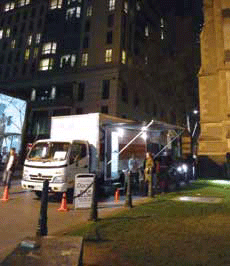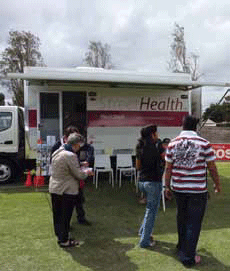Homeless people are some of the heaviest users of hospital emergency departments;3 these people may receive more appropriate care in the primary healthcare setting. However, homeless, marginalised and disadvantaged groups may be reluctant to access mainstream health services. They may feel uncomfortable attending general practice clinics or find it difficult to keep appointments. In addition, general practice clinics in western Melbourne lack after hours cover. As a result, preventable and simple conditions in this patient group may be neglected until the condition becomes more serious.
About StreetHealth
In response to local needs, PivotWest (formerly known as Western Melbourne Division of General Practice) successfully applied for a grant from the Lord Mayor's Charitable Fund to establish StreetHealth. StreetHealth is an innovative mobile street-based after hours primary healthcare service targeting homeless, transient and other disadvantaged groups in western Melbourne (see Resources). It was inspired by the Western Australian 'StreetDoctor' mobile health services run by Perth Primary Care Network and Fremantle GP Network (see Resources).
A broad range of local community and health services were consulted during the establishment phase and stakeholders continue to have input. For example, PivotWest and StreetHealth always consult local general practices before trialling new sites as the aim is to complement, rather than replace, existing general practitioners. Importantly, patient registration forms ask permission to forward information to the patient's regular GP, if they have one, and patients are encouraged to move toward having a regular GP. We aim to link patients back into mainstream care and support pathways to exit homelessness.
StreetHealth has been on the road and delivering services since June 2009. Medicare billings have not covered costs, so innovation, donations and fundraising are essential to maintain and expand the service. Our objectives are shown in Table 1.
The StreetHealth team delivers services at regular evening clinic locations such as Whitten Oval, Footscray; Sunshine Central Bus Depot; and outside St Paul's Cathedral, Melbourne. Identified areas of need, such as long-stay caravan parks, are also visited. The core team includes the driver/safety officer and various combinations of GP, nurse and mental health professional. At times, other organisations looking to connect with this population have travelled with the van, including staff from Centrelink, 2011 census collectors, medical students, drug and alcohol services and a needle and syringe program.
The StreetHealth van is customised for GP consultations, mindful of a patient's dignity and privacy. It is an accredited practice and offers most general practice services, except immunisation as the power supply to the vaccine refrigerator is unreliable. Internet access is available to GPs during consultations.
We are continually looking for ways to encourage potential clients to find us, linger and return. During winter an outdoor heater is a great magnet to draw people in; many health promotion conversations have started after a casual encounter around the heater. Pamphlets near the van contain information about local services and health promotion. Drinks and simple food, donated by a local supermarket, are provided outside the van.
As most of our patients have temporary accommodation and move on, StreetHealth continually needs to promote its service and sites. Posters and flyers are distributed in advance to remind caravan park residents of our visits and we have advertised on supermarket dockets. A sandwich board on the pavement announces 'bulk-billing doctor' or 'doctor and nurse on duty' and similar magnetic signs are on the van. Business cards, promotional postcards or brochures are given to agencies that may have potential clients.
Table 1. The objectives of StreetHealth
- To provide an easily accessible, nonjudgemental, multidisciplinary medical service for the most disadvantaged people in Melbourne's inner west
- To provide an access point to the healthcare system for homeless and transient people
- To empower disadvantaged and marginalised people to confidently engage with the health system, and improve their knowledge of health and wellbeing issues
- To improve partnerships with health and community support services in western Melbourne and to create strong links and referral pathways to other relevant services and specialists
|
Improving access
Other organisations with outreach services to improve access in similar populations include Mobile GP, StreetDoctor and FREO StreetDoctor (see Resources).
StreetHealth continually refines and reflects on strategies to engage our marginalised and disadvantaged groups. Mainstream general practices may like to consider and adapt some of these strategies to improve access and better meet the needs of these groups, either by considering developing an outreach service or by making their clinics more friendly and accessible to this population.
First impressions
Our experience at StreetHealth is that a warm nonjudgemental welcome from staff can make a big difference to people who are fragile or nervous about seeking medical care. Our driver/ safety officers are carefully recruited, briefed and trained in their essential 'meet and greet' role. Importantly, during GP consultations these officers are our public face outside the van. A smile and welcoming conversation can engage potential clients and help them gain enough confidence and trust to see the health staff.

Figure 1. StreetHealth outside St Paul's Cathedral, Melbourne

Figure 2. StreetHealth at Health Promotion Family Day
Foster relationships and partnerships with local services
It is vital to know your local resources and find opportunities to meet the staff that will be seeing your patients on referral. Multidisciplinary education events and open days can help facilitate this. It helps to build a list of relevant resources and contacts and to ask new staff to review and update it during their orientation. Importantly, Access to Allied Psychological Services (ATAPS) Tier 2, which is part of the Medicare Benefits Schedule Better Access initiative,4 provides mental healthcare for patients from specific target groups including the homeless, or those at risk of homelessness, and those at risk of suicide.5
Research your target group
Investigating the best ways to access your target group takes time and patience. PivotWest carefully researched which locations would be the most appropriate for our clinics. Relevant agencies, boarding houses, soup kitchens and charities will know their clients, where to find them and their potential needs.
Connect with the community
The internet and social networking can be extremely useful when reaching out to your target group. It is important to keep your practice web page up-to-date and include relevant keywords such as 'special interest in homeless people'. Similarly, taking advantage of health promotion opportunities can help improve your reach in the community. For example, StreetHealth often attends local festivals, shopping centres and fetes. In addition to providing daytime health promotion activities at these locations, we are able to promote our after hours service more widely.
Expect the unexpected
While there are many potential rewards from working with a service such as StreetHealth there are often also significant challenges. While StreetHealth has many success stories, sometimes patients may not accept offers of help or react in the way you expect. This requires a patient and nonjudgemental approach. Consider the impact of life circumstances and mental health issues on the patient's decision-making. Practise your listening and communication skills and remain patient centred. It is essential to proactively discuss boundaries with your health team and develop policies around issues such as prescribing drugs of dependence, needle and syringe programs, drug and alcohol programs or safe sex. Referral pathways and linkages with local services can help provide appropriate support and training. Recall and reminders can also be challenging in transient populations; StreetHealth's patient registration form asks permission to contact patients by text message and telephone.
Practical issues
Medicare billings are unlikely to provide adequate funds for outreach services so it is vital to think outside the square and look for grants to set up a pilot or evaluation. Students and volunteers can be extremely valuable to keep services staffed on an ongoing basis. When customising an outreach vehicle, it is important to consider if a standard or a heavy vehicle driver licence will be required.
Safety is essental for any outreach program. At StreetHealth, all staff members carry duress alarms and the consulting room has an alert button and two exit doors. If an incident occurs, protocols and code words are in place to convey the situation. Staff are briefed about possible scenarios and when to pack up and leave. Training includes role plays. It is important to liaise with local police to discuss safety and whether closed circuit television or routine patrols are available.
Benefits for GPs
General practitioners benefit from being involved in outreach services in many ways: the addition of range to the usual GP role, the opportunity to work outdoors and beyond the confines of a clinic and the ability to meet patients on their ground.
Resources
Conflict of interest: Susan Hookey is on the board of PivotWest and receives board fees for this role.